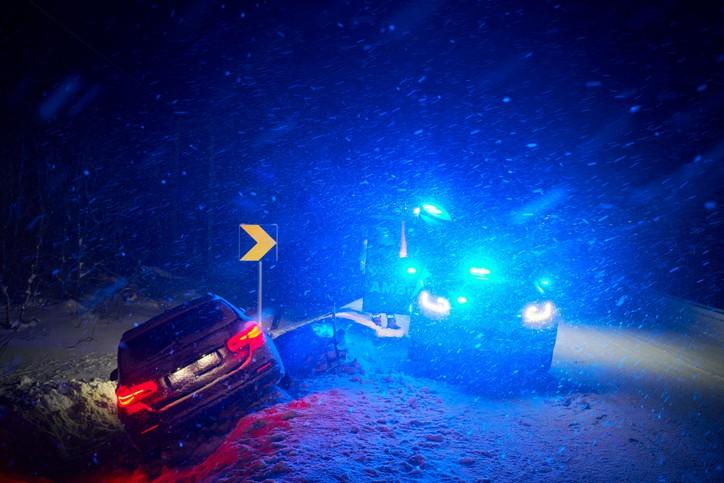As experienced personal injury attorneys, the team at Altman Nussbaum Shunnarah has witnessed the devastating impact that motor vehicle accidents can have on individuals and families. While many factors contribute to these incidents, many people wonder whether poor weather conditions lead to an increased number of crashes. Let’s explore the relationship between adverse weather and motor vehicle accidents and consider some valuable insights for drivers dealing with challenging conditions on the road.

The Link Between Weather and Accident Rates
Numerous studies have established a clear correlation between inclement weather and heightened accident rates. According to research conducted by the Federal Highway Administration, approximately 21% of all motor vehicle crashes in the United States are weather-related. This translates to nearly 1.2 million accidents annually, resulting in over 5,000 fatalities and 418,000 injuries.
The primary culprits behind these weather-related accidents are rain, snow, ice, and fog. Each of these conditions presents unique challenges for drivers, affecting visibility, traction, and vehicle control. Understanding how these elements influence driving safety is crucial for minimizing the risk of accidents.
Rain
Rain is the most common adverse weather condition encountered by drivers. When rain falls on roadways, it mixes with oil and grime, creating a slick surface that reduces tire traction. This loss of traction makes it more difficult for vehicles to stop, turn, and maintain stability, increasing the likelihood of accidents.
Besides, heavy rainfall can significantly impair visibility. When drivers cannot see clearly, they are less likely to identify potential hazards in time to avoid them. Hydroplaning, which occurs when a vehicle speeds over a pool of water and loses contact with the road, is another dangerous phenomenon associated with rainy conditions.
Snow and Ice
In colder regions, snow and ice pose significant threats to road safety. Snow accumulation can obscure lane markings and road signs, hence making it challenging for drivers to drive safely. As snow melts and refreezes, it can create patches of black ice—an almost invisible hazard that can cause vehicles to skid out of control.
Even when roads are plowed and salted, the presence of snow and ice necessitates longer stopping distances and slower speeds. Drivers who fail to adjust their driving habits accordingly are at a higher risk of being involved in accidents.
Fog
Fog is a particularly treacherous weather condition because it can drastically reduce visibility without the apparent risks associated with rain, snow, or ice. When dense fog sets in, drivers may struggle to see more than a few feet ahead of their vehicles, making it difficult to anticipate and react to obstacles or other cars.
In foggy conditions, it is essential for drivers to reduce their speed, increase following distance, and use low-beam headlights to improve visibility without causing glare. Failure to take these precautions can result in serious multi-vehicle accidents.
Strategies for Safer Driving in Adverse Weather
While it may not be possible to completely eliminate weather-related accidents, there are several steps drivers can take to minimize their risk:
- Slow down: Reducing speed is crucial in poor weather conditions, as it allows for greater control and longer reaction times.
- Increase following distance: Maintaining a safe distance from the vehicle ahead provides a buffer zone in case of sudden stops or skids.
- Ensure proper vehicle maintenance: Regular tire rotations, brake inspections, and windshield wiper replacements can help ensure optimal performance in challenging weather.
- Avoid distractions: Distracted driving is especially dangerous in adverse weather, as it further reduces a driver’s ability to respond to changing conditions.
- Plan ahead: Checking weather forecasts and planning routes accordingly can help drivers avoid the worst of inclement weather.
The Role of Law Firms in Weather-Related Accidents
When weather-related accidents occur, it is essential for those involved to seek the guidance of experienced personal injury attorneys. At Altman Nussbaum Shunnarah, we understand the complexities of these cases and work tirelessly to protect the rights of our clients.
Our team can help investigate the issues regarding the case, collect evidence, and develop a reliable case to secure fair compensation for injuries, property damage, and other losses. We recognize the physical, emotional, and financial toll accidents have on victims and their families, and we are committed to providing the support and advocacy they need during this challenging time.
Reach Out to a Skilled Car Accident Attorney for Help
The relationship between poor weather conditions and motor vehicle accidents is well-established, with rain, snow, ice, and fog contributing to a significant number of crashes each year. Understanding the unique risks associated with each of these conditions and adopting safer driving practices ensures motorists can reduce their chances of being involved in a weather-related accident. Contact us today for legal help.




